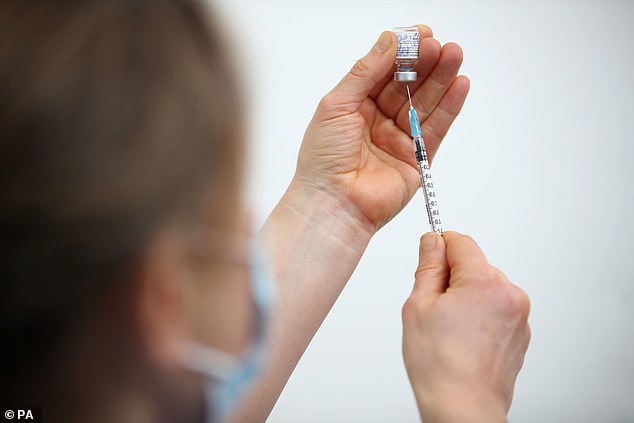Hundreds of thousands of people will receive cholesterol-lowering jabs from their GP twice a year as an alternative to statins, it was announced today.
The ‘game-changing’ treatment, called inclisiran, is now rolled out on the NHS after it was approved by the UK’s medical watchdog.
The drug cuts levels of ‘bad’ LDL cholesterol – a fatty substance which collects in blood vessels – by about 50 per cent, making it as effective as high-dose statins. It is delivered by injection once every six months, saving patients the need to take daily statin tablets.
The National Institute for Health and Care Excellence (Nice) has initially approved the jab only for patients with high cholesterol who already have heart disease or have had a heart attack or stroke – about 300,000 in total.

Hundreds of thousands of people will receive cholesterol-lowering jabs from their GP twice a year as an alternative to statins, it was announced today (stock image)
What is inclisiran? And how does it work?
The ‘game-changing’ treatment, called inclisiran, is now rolled out on the NHS after it was approved by the UK’s medical watchdog.
Inclisiran is the first convenient and effective alternative to statins, which can cause side effects.
The drug helps the liver remove cholesterol from the blood by blocking the production of a protein called PCSK9 which reduces the organ’s ability to remove cholesterol.
Inclisiran is usually sold for nearly £2,000 per dose, meaning it would cost around £4,000 a year per patient.
But NHS England said it had negotiated a confidential ‘world-leading’ deal with the manufacturer Novartis.
For comparison, statins cost around £20 a year per patient.
Around 300,000 patients will receive the drug over the next three years.
Advertisement
Experts claimed it will save around 30,000 lives and prevent 55,000 heart attacks and strokes within the next decade.
Health Secretary Sajid Javid said the ‘life-saving’ treatment was a ‘huge step forward in tackling the scourge of heart disease’.
Patients will be injected by nurses at GP surgeries across England, with a second dose three months later and then injections twice a year.
Inclisiran is more effective if taken alongside statins – but it can be used on its own for those who do not tolerate the pills.
Research is ongoing to see if the drug could be used on a preventative basis to benefit millions who are at risk of heart problems.
High cholesterol affects around two in five adults and is a major cause of heart disease, which is responsible for one in four deaths in England.
Some 8million adults in the UK are prescribed statins – but some are put off by its side effects, such as headaches and the hassle of taking a pill every day.
Inclisiran is the first convenient and effective alternative to the pills.
The drug helps the liver remove cholesterol from the blood by blocking the production of a protein called PCSK9 which reduces the organ’s ability to remove cholesterol.
Inclisiran is usually sold for nearly £2,000 per dose, meaning it would cost around £4,000 a year per patient.
But NHS England said it had negotiated a confidential ‘world-leading’ deal with the manufacturer Novartis.

Health Secretary Sajid Javid said the ‘life-saving’ treatment was a ‘huge step forward in tackling the scourge of heart disease’
Around 300,000 patients will receive the drug over the next three years. Statins cost around £20 a year per patient.
NHS boss Amanda Pritchard said the deal will ‘enable hundreds of thousands of people to benefit from this revolutionary treatment, while also being fair to taxpayers’.
Meindert Boysen, deputy chief executive of Nice, said: ‘Inclisiran represents a potential game-changer in preventing thousands of people from dying prematurely from heart attacks and strokes.’
Professor Kausik Ray, from Imperial College London, who led research into the drug, said: ‘It’s great news for patients. It will reduce their medication burden and offer convenience.’
Trend towards working full-time may have raised heart attack risk in women, study suggests
The trend towards more full-time working among women may have raised their risk of heart attack and stroke, a Swiss study has suggested.
Stress, sleep disorders and fatigue have risen at an ‘alarming’ rate among this group in recent decades, experts warn.
These factors contribute to cardiovascular disease, alongside smoking, high blood pressure and high cholesterol. Scientists from the University of Zurich analysed data on 22,000 men and women from 2007, 2012 and 2017 as the number of women working full-time rose from 39 to 44 per cent.
Meanwhile, those suffering work stress rose from 59 per cent in 2012 to 66 per cent in 2017 with the increases bigger in women. The results will be shown at the European Stroke Organisation Conference.
Advertisement
Source link : https://www.dailymail.co.uk/health/article-9945241/Life-saving-twice-yearly-injections-replace-daily-statin-tablets-thousands.html











